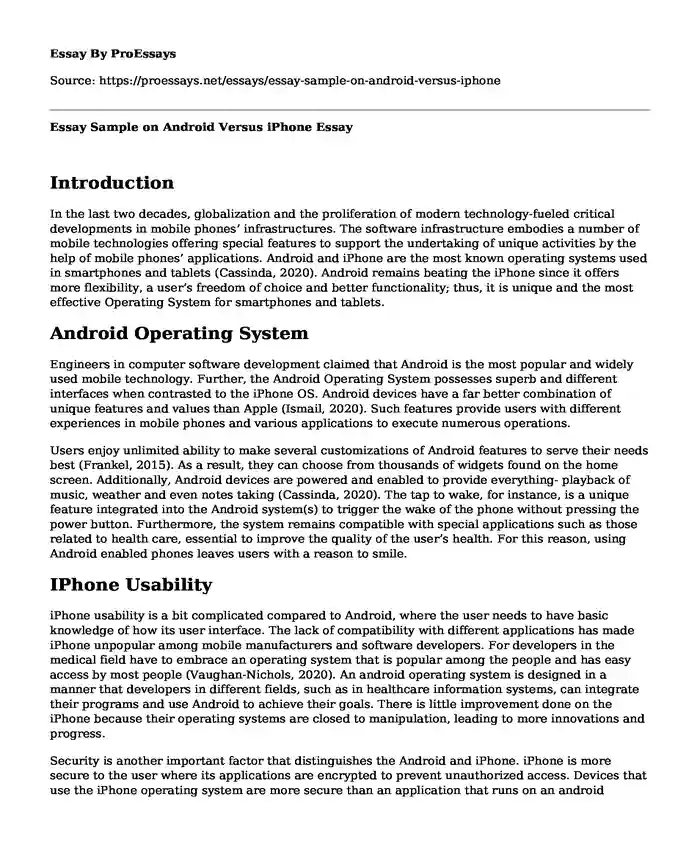Introduction
In the last two decades, globalization and the proliferation of modern technology-fueled critical developments in mobile phones’ infrastructures. The software infrastructure embodies a number of mobile technologies offering special features to support the undertaking of unique activities by the help of mobile phones’ applications. Android and iPhone are the most known operating systems used in smartphones and tablets (Cassinda, 2020). Android remains beating the iPhone since it offers more flexibility, a user’s freedom of choice and better functionality; thus, it is unique and the most effective Operating System for smartphones and tablets.
Android Operating System
Engineers in computer software development claimed that Android is the most popular and widely used mobile technology. Further, the Android Operating System possesses superb and different interfaces when contrasted to the iPhone OS. Android devices have a far better combination of unique features and values than Apple (Ismail, 2020). Such features provide users with different experiences in mobile phones and various applications to execute numerous operations.
Users enjoy unlimited ability to make several customizations of Android features to serve their needs best (Frankel, 2015). As a result, they can choose from thousands of widgets found on the home screen. Additionally, Android devices are powered and enabled to provide everything- playback of music, weather and even notes taking (Cassinda, 2020). The tap to wake, for instance, is a unique feature integrated into the Android system(s) to trigger the wake of the phone without pressing the power button. Furthermore, the system remains compatible with special applications such as those related to health care, essential to improve the quality of the user’s health. For this reason, using Android enabled phones leaves users with a reason to smile.
IPhone Usability
iPhone usability is a bit complicated compared to Android, where the user needs to have basic knowledge of how its user interface. The lack of compatibility with different applications has made iPhone unpopular among mobile manufacturers and software developers. For developers in the medical field have to embrace an operating system that is popular among the people and has easy access by most people (Vaughan-Nichols, 2020). An android operating system is designed in a manner that developers in different fields, such as in healthcare information systems, can integrate their programs and use Android to achieve their goals. There is little improvement done on the iPhone because their operating systems are closed to manipulation, leading to more innovations and progress.
Security is another important factor that distinguishes the Android and iPhone. iPhone is more secure to the user where its applications are encrypted to prevent unauthorized access. Devices that use the iPhone operating system are more secure than an application that runs on an android operating system (Ismail, 2020). A medical coder is concerned about the security of data shared across the health information management systems. Users who use the iPhone do not lose their data. The data is accessed by unauthorized people even when the devices get lost because of the operating system's security through encryption. Healthcare-related information is susceptible and needs to be secured from unauthorized access.
Conclusion
Software developers including in the medical field, consider the future of the software they use in terms of where the software will become more people and serve their purpose. The more people use the software, the better because it will serve their purpose (Ismail, 2020). Android is more popular than iPhone in terms of the number of people that use devices that run either of them in their devices. Developers would consider integrating their Android programs because their target audience is likely to access the programs and use them for the intended purpose. Android is the main convenient operating system for all the stakeholders because of all the stakeholders' usability.
References
Cassinda, F. (2020). Android vs iOS - Difference and Comparison | Diffen. Diffen.com. Retrieved 12 September 2020, from
https://www.diffen.com/difference/Android_vs_iOS#:~:text=iOS,-Diffen%20%E2%80%BA%20Technology%20%E2%80%BA%20Computers&text=Google's%20Android%20and%20Apple's%20iOS,customizable%20from%20top%20to%20bottom.
Frankel, C. (2015). You prefer Android; You just don’t know it yet. Veterinary Team Brief, p18. http://connection.ebscohost.com/c/opinions/111832148/you-prefer-android-you-just-dont-know-yet
Ismail, A. (2020). iPhone vs. Android: Which is better for you? Tom's Guide. Retrieved 12 September 2020, from https://www.tomsguide.com/face-off/iphone-vs-android.
Vaughan-Nichols, S. (2020). How to decide between Android and iPhone. Computerworld. Retrieved 12 September 2020, from
https://www.computerworld.com/article/2468474/iphone-vs-android-which-is-better-for-you.html.
Cite this page
Essay Sample on Android Versus iPhone. (2023, Dec 12). Retrieved from https://proessays.net/essays/essay-sample-on-android-versus-iphone
If you are the original author of this essay and no longer wish to have it published on the ProEssays website, please click below to request its removal:
- Alternative Service Delivery Offered by the Wema Bank ALAT System
- Enterprise Content Management Implementation in Current Enterprises Paper Example
- Cybersecurity: Protecting Businesses From Data Compromise - Essay Sample
- Essay Example on Amazon Focuses on Data Analytics to Improve Customer Relationships
- Managing Global R&D Projects: Challenges & Innovations - Essay Sample
- Paper Example on Amazon.com: Global Giant in Retail E-commerce, CSR Commitment Questioned
- Free Report Sample on Uber Significant Forces







